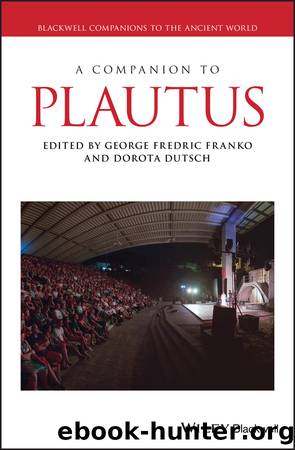A Companion to Plautus by Franko George Fredric;Dutsch Dorota; & Dorota Dutsch

Author:Franko, George Fredric;Dutsch, Dorota; & Dorota Dutsch [Franko, George Fredric & Dutsch, Dorota]
Language: eng
Format: epub
ISBN: 9781118957981
Publisher: Wiley
Published: 2020-03-04T00:00:00+00:00
Improvisation: Or, the Give and Take of the World
Before delving into the role of improvisation in Plautine plays themselves, we need to keep in mind that, as Marshall (2006, p. 265) argues, âimprovisation is not a theatrical genre but is a means of producing a dramatic text.â Presumably any kind of theater can be created through improvisation, and the improvisatory technique, as opposed to scripted theater, will have dramatic impacts on the nature of a given theater piece within its own generic sphere.
It is also crucial to remind ourselves briefly about the nature of the theatrical scene in Rome that Plautus inherited. As VogtâSpira (1995; 1998) points out, scholars of Plautus have typically focused on the connection between Roman comedy and Athenian New Comedy with nods to the local Italian, improvised traditions (e.g. mime, Atellanae, etc.). Livy (7.2) notes the introduction in Rome of theatrical entertainment (ludi scaenici) in 364 BCE when other attempts to appease the wrath of the gods and lift a pestilence had failed (see Chapter 1, p. 18). As VogtâSpira observes, Livy places heavy emphasis on improvised forms of theater that preceded the written and continued to thrive past the arrival of the first Latin playwright, Livius Andronicus, and his written adaptations from Greek models. Rather than focusing on the written Greek models, we should, as VogtâSpira encourages us, recognize that it is the local improvised tradition into which the palliatae inserted themselves. Thus, the Plautine audience would have been much more familiar with the expectations of improvised theater than the highly scripted kind of theater that is the norm in the Greek originals.
It is best to think about the relationship between improvisatory and scripted theater as a continuum, as Marshall (2006, p. 252) has suggested. A purely improvised theater would mean that the theater is actually being performed at the exact moment of composition â with no framework established before the actors begin their work. A purely scripted theater would have the actor perform the text established beforehand by the playwright with no modifications whatsoever; a difficult task, as anyone who has performed in a play knows. Looking to ancient drama, we can situate various traditions along this scale. Toward the improvisatory end, we would situate the Atellanae. Taking commedia dell'arte as an analogue, we would see a form that is not purely improvisatory, given the standard scenarios, routines (lazzi), and stock characters that performers use to create their pieces, but at the same time, within that basic framework, there is great flexibility for the performers to explore whatever potentials they can. Toward the scripted end, we would situate Athenian New Comedy. Here, the poet carefully scripts the action to unfold. Goldberg (1995, p. 35) has observed that âMenandrean comedy in particular not just poses and solves a specific problem, but offers its audience the pleasure of watching (or reading) an action develop in the certainty that ⦠the end will be consistent with the beginning.â Given how much plot drives Menandrean comedy, it becomes difficult to imagine much room for improvisation within that tradition.
Download
This site does not store any files on its server. We only index and link to content provided by other sites. Please contact the content providers to delete copyright contents if any and email us, we'll remove relevant links or contents immediately.
The Power of Myth by Joseph Campbell & Bill Moyers(921)
Half Moon Bay by Jonathan Kellerman & Jesse Kellerman(903)
A Social History of the Media by Peter Burke & Peter Burke(876)
Inseparable by Emma Donoghue(832)
The Nets of Modernism: Henry James, Virginia Woolf, James Joyce, and Sigmund Freud by Maud Ellmann(719)
The Complete Correspondence 1928-1940 by Theodor W. Adorno & Walter Benjamin(700)
The Spike by Mark Humphries;(698)
A Theory of Narrative Drawing by Simon Grennan(696)
Ideology by Eagleton Terry;(651)
Bodies from the Library 3 by Tony Medawar(641)
World Philology by(640)
Culture by Terry Eagleton(635)
Farnsworth's Classical English Rhetoric by Ward Farnsworth(631)
A Reader’s Companion to J. D. Salinger’s The Catcher in the Rye by Peter Beidler(607)
Adam Smith by Jonathan Conlin(600)
Game of Thrones and Philosophy by William Irwin(582)
High Albania by M. Edith Durham(579)
Comic Genius: Portraits of Funny People by(575)
Monkey King by Wu Cheng'en(573)
